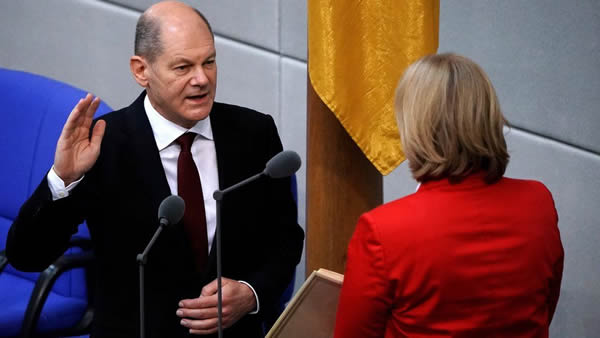
Olaf Scholz has been sworn in as Germany’s new chancellor, bringing to an end Angela Merkel’s historic 16 years as leader.
He was voted in by the German parliament, where his three-party coalition has a substantial majority, and given a standing ovation.
His centre-left Social Democrats will govern alongside the Greens and the business-friendly Free Democrats.
The handover of power marks an end to Mrs Merkel’s 31-year political career.
Mr Scholz, a soft-spoken 63-year-old, steered the Social Democrats to election victory in late September, positioning himself as the continuity candidate because he played a key role in the Merkel government as vice-chancellor.
The German parliament, the Bundestag, backed his appointment by 395 votes to 303, and he was then formally appointed as the ninth federal chancellor by President Frank-Walter Steinmeier.
After the vote in parliament, he was asked by Bundestag President Bärbel Bas whether he accepted the appointment and said “yes”.
He later returned to parliament to take the oath of office. Unlike his predecessor, he left out the religious reference “so help me God”.
Since the election, Mr Scholz’s party has worked with the Greens and the Free Democrats on a coalition deal, which was finally signed on Tuesday. All 16 ministers took the oath of office on Wednesday, becoming Germany’s first cabinet to include as many women as men.
The new government has ambitious plans to fight climate change by phasing out coal early and focusing on renewable energy, but their initial priority will be tackling the coronavirus pandemic.
Health authorities have recorded another 69,601 cases in the past 24 hours and a further 527 deaths – the highest number since last winter.
Mr Scholz is already a known and trusted face in Berlin and Brussels. He marketed himself to voters as sort of Merkel Mark Two, despite hailing from a different political party.
But it’s not all about continuity, and friends and trade partners of this rich and powerful nation will be watching closely.
Mr Scholz’s coalition government is a never-before-seen marriage of convenience. What unites them, they claim, is a determination to modernise Germany, while preserving the country’s treasured stability.
Immediate challenges for them are:
- Covid – Germany is in the midst of a pernicious fourth wave and considering mandatory vaccination
- The threat of a Russian invasion of Ukraine
- Angela Merkel was accused of putting trade before politics. Team Scholz is expected to be somewhat tougher on Moscow and Beijing despite the potential economic hit to German business.
Relations with Washington may improve as a result, though, and that is a declared priority of Olaf Scholz’s fledgling coalition.
Source: BBC























